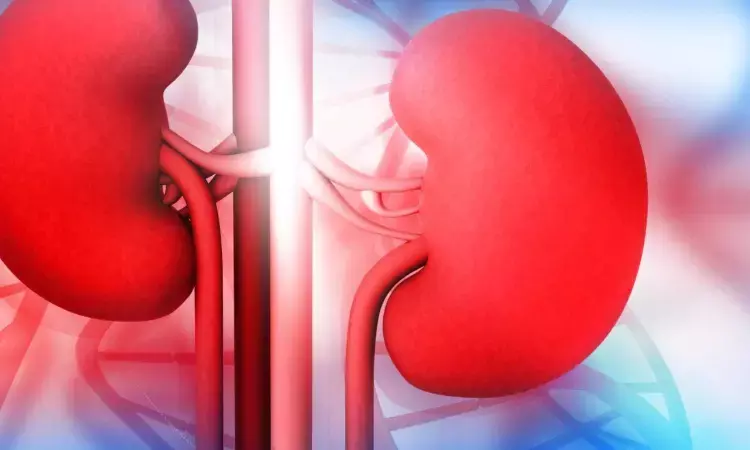- Home
- Medical news & Guidelines
- Anesthesiology
- Cardiology and CTVS
- Critical Care
- Dentistry
- Dermatology
- Diabetes and Endocrinology
- ENT
- Gastroenterology
- Medicine
- Nephrology
- Neurology
- Obstretics-Gynaecology
- Oncology
- Ophthalmology
- Orthopaedics
- Pediatrics-Neonatology
- Psychiatry
- Pulmonology
- Radiology
- Surgery
- Urology
- Laboratory Medicine
- Diet
- Nursing
- Paramedical
- Physiotherapy
- Health news
- Fact Check
- Bone Health Fact Check
- Brain Health Fact Check
- Cancer Related Fact Check
- Child Care Fact Check
- Dental and oral health fact check
- Diabetes and metabolic health fact check
- Diet and Nutrition Fact Check
- Eye and ENT Care Fact Check
- Fitness fact check
- Gut health fact check
- Heart health fact check
- Kidney health fact check
- Medical education fact check
- Men's health fact check
- Respiratory fact check
- Skin and hair care fact check
- Vaccine and Immunization fact check
- Women's health fact check
- AYUSH
- State News
- Andaman and Nicobar Islands
- Andhra Pradesh
- Arunachal Pradesh
- Assam
- Bihar
- Chandigarh
- Chattisgarh
- Dadra and Nagar Haveli
- Daman and Diu
- Delhi
- Goa
- Gujarat
- Haryana
- Himachal Pradesh
- Jammu & Kashmir
- Jharkhand
- Karnataka
- Kerala
- Ladakh
- Lakshadweep
- Madhya Pradesh
- Maharashtra
- Manipur
- Meghalaya
- Mizoram
- Nagaland
- Odisha
- Puducherry
- Punjab
- Rajasthan
- Sikkim
- Tamil Nadu
- Telangana
- Tripura
- Uttar Pradesh
- Uttrakhand
- West Bengal
- Medical Education
- Industry
Atrasentan reduces triglycerides, albuminuria, and LDL-C in patients with type 2 diabetes and CKD

Netherlands: In high-risk patients with type 2 diabetes (T2D) and CKD (chronic kidney disease), atrasentan provides cardioprotection, is the conclusion drawn from a recent study.
The study findings presented at the 2022 Annual Meeting of the ASN (American Society of Nephrology) held in Orlando showed that atrasentan reduces triglycerides, LDL-C, and albuminuria. At 12 weeks of treatment with atrasentan, achieved albuminuria corresponded to achieved PCSK9.
Albuminuria has been demonstrated to increase proprotein convertase subtilisin kexin type 9 (PCSK9), syndecan-1 shedding, and PCSK9-syndecan-1 interaction, resulting in impaired clearance of hepatic lipoprotein. Atrasentan, the endothelin receptor antagonist, reduces albuminuria. This effect coincides with distinct reductions in triglycerides and LDL-C.
Against the above background, Pragyi Shrestha, Universitair Medisch Centrum Groningen, and colleagues aimed to determine whether a reduction of albuminuria and lipids with atrasentan lowers PCSK9 and syndecan-1 shedding.
For this purpose, the researchers included patients with type 2 diabetes and CKD who participated in RADAR, a phase II clinical trial. Ninety-four patients were randomized to atrasentan (0.75mg/d or 1.25mg/d) treatment and 26 to placebo for 12 weeks. Patients were stabilized to a maximum labelled dose of RAAS inhibitor. Measuring serum lipids, urine albumin creatinine ratio (UACR), syndecan-1, and PCSK9 were done at baseline and 12 weeks.
The study led to the following findings:
- Atrasentan treatment reduced UACR by 37.1%, LDLc by 17.12 mg/dL, triglycerides by 47.4 mg/dL and PCSK9 by -25.9 ng/mL compared to placebo.
- No effects were observed on HDLc and syndecan-1.
- Multivariate analysis after adjusting for lipid and kidney function parameters and baseline demographics showed that achieved albuminuria levels during atrasentan treatment correlated with achieved levels of PCSK9 (β 0.00227 per unit increment in PCSK9).
"Atrasentan reduces LDL-C, albuminuria, and triglycerides in patients with T2D and CKD. At 12 weeks of treatment with atrasentan, achieved albuminuria correlated with achieved PCSK9," the researchers wrote. "Our findings might suggest a pathway by which atrasentan provides cardio-protection in high-risk patients with T2D and chronic kidney disease."
Reference:
SA-PO270 Poster Saturday Diabetic Kidney Disease: Clinical - II Improvement of Albuminuria by the Endothelin Receptor Antagonist Atrasentan Correlates to PCSK9 Reduction in Type 2 Diabetic Nephropathy Patients was presented at the ASN Kidney Week 2022.
Dr Kamal Kant Kohli-MBBS, DTCD- a chest specialist with more than 30 years of practice and a flair for writing clinical articles, Dr Kamal Kant Kohli joined Medical Dialogues as a Chief Editor of Medical News. Besides writing articles, as an editor, he proofreads and verifies all the medical content published on Medical Dialogues including those coming from journals, studies,medical conferences,guidelines etc. Email: drkohli@medicaldialogues.in. Contact no. 011-43720751


